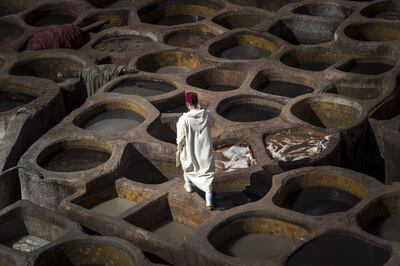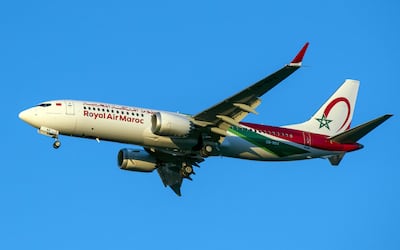One year after its deadliest earthquake in 60 years, Morocco is seeking foreign investment to boost its tourism industry ahead of co-hosting the Fifa World Cup in 2030.
The North African country plans to develop infrastructure ranging from hotels to stadiums for the football tournament and is touting a new programme of incentives to attract investors to big-ticket projects, Imad Barrakad, chief executive of the Moroccan Agency for Tourism Development, told The National.
“The World Cup will happen in six cities, and we have to develop the infrastructure to get ready for the event. It is very important to have more hotels and more activities to do and it's something that we have to work on early,” he said, speaking on the sidelines of the Future Hospitality Summit in Dubai.
“We are very close to the GCC market and investors from the GCC are welcome to invest. We are here to help them. We have lots of discussions with Gulf investors,” he said, declining to provide details.
In July, the UAE and Morocco finalised the terms of a comprehensive economic partnership agreement to boost bilateral trade and investment ties. The deal will establish platforms for investment and private-sector collaboration in priority sectors such as tourism, infrastructure, transport and logistics.

In 2023, Morocco launched its Investment Charter, which aims to make the country attractive to foreign and domestic investors by offering incentives, subsidies and grants to companies.
Incentives include government cash contributions for up to 30 per cent of an eligible project's total investment amount, exemptions from paying VAT on capital equipment or materials acquired locally for a period of 36 months, and custom duty exemptions on imported goods or equipment for 36 months.
Foreign direct investment into Morocco's tourism industry is currently 20 per cent of the total investment by the private sector, and the target is to increase this to 30 per cent by 2026, Mr Barrakad said.
“We are looking at more investments in luxury and mid-scale hotels, leisure parks and the MICE [meetings, incentives, conferences, and exhibitions] infrastructure,” he said.
At the summit in Dubai, the Moroccan delegation touted opportunities including a $40 million investment ticket to plan and develop an amusement park in Casablanca and a $300 million investment ticket to develop a resort in a theme park in Marrakesh.
Morocco has detailed its 2023-2026 strategic road map to boost the country's travel and tourism industry. Tourism accounts for 7 per cent of Morocco's gross domestic product and is an important source of foreign currency. The country, which hosted a record 14.5 million tourists last year, aims to attract 17.5 million tourists in 2026 and 26 million by 2030 when it will co-host the World Cup with Spain and Portugal.
In the first half of 2024, 7.4 million tourists visited Morocco, marking a 14 per cent increase on the same period in 2023. It anticipates ending this year with 15.5 million to 16 million tourists, driven by marketing campaigns, higher airline connectivity, hotel openings and a focus on promoting Moroccan gastronomy, culture and villages, Mr Barrakad said.

To draw more international visitors, Morocco is investing in its aviation sector. National airline Royal Air Maroc is planning to quadruple its fleet to 200 aircraft by 2037 while Morocco’s airport capacity is expected to double to more than 90 million passengers by 2035.
In 2023 more than 12.4 million passengers travelled to Morocco by air, marking a 68 per cent increase over the past decade, according to the International Air Transport Association.
In the next 20 years, Morocco’s aviation sector is expected to grow significantly with passenger numbers expected to increase by 50 per cent in 2043, Iata said. Morocco has the potential to play a key role in linking Africa to Europe and North America, it said.
“In the face of this potential, it is essential that the government focus on some key elements to support success. In particular, investments must yield cost-effective infrastructure, policies must align to support the achievement of net zero carbon emissions by 2050, and the regulatory environment should enable growth based on global standards,” Willie Walsh, Iata's director general, said in a speech in Marrakesh on October 1.
Morocco's aviation and tourism ambitions loom large a year after a devastating earthquake struck the country, killing about 3,000 people and injuring another 5,000.
About 300 hotels received state incentives of up to $200,000 to repair and renovate properties damaged during the disaster, according to Mr Barrakad.
“The earthquake is behind us,” he said. “For the hospitality sector, we gave incentives to investors who want to renew their hotels,” he said.
Morocco last year opened 100 hotels, with major industry players such as the Ritz-Carlton and the Four Seasons opening properties in the country, he said.


